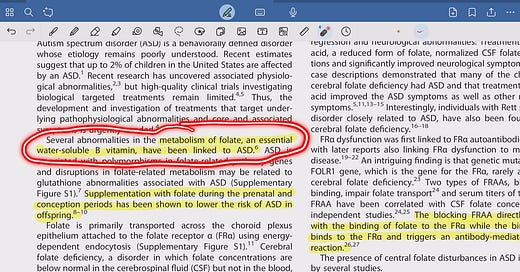If you didn’t catch my last study walk-through, I covered a new 2024 study on folinic acid supplementation for children with autism.
Today, I want to take you back a few years to an earlier foundational article that came out in 2018 in Molecular Psychiatry. The results?
Still exciting.
Still worth talking about.
💡 The Setup
This study took a slightly different approach but asked the same critical question:
Can high-dose folinic acid improve autism symptoms—especially communication—in children who have folate receptor autoantibodies?
Here’s what made this one noteworthy:
Double-blind, placebo-controlled, randomized (i.e., the gold standard)
12-week treatment period
Age range: 3 to 14 years old
Dose: 2 mg/kg/day of folinic acid
🔬 What They Found
The big takeaway:
Significant improvements in verbal communication, particularly in kids with folate receptor autoantibodies.
Other notable improvements in the folinic acid group included:
Irritability
Lethargy
Stereotypic behaviors
Hyperactivity
Inappropriate speech
These were tracked using validated symptom questionnaires like the Aberrant Behavior Checklist (ABC), and the results were clear: folinic acid outperformed placebo.
🧠 Why Folinic Acid?
This study does a great job breaking down why folinic acid (not folic acid) may work better for some kids with autism:
It bypasses blocked or dysfunctional folate receptors at the blood-brain barrier using alternative pathways.
It enters the folate cycle directly without needing to be converted (which some kids may struggle with).
It helps normalize folate-dependent one-carbon metabolism, which is crucial for brain development and function.
In other words: Folinic acid gets where it needs to go—even when other forms of folate can’t.
📊 What About Safety?
No significant difference in adverse events between folinic acid and placebo groups.
Most kids completed the study with over 90% retention, which is rare in studies like this.
And compared to the only two FDA-approved medications for autism (both antipsychotics), folinic acid comes without the weight gain, cholesterol spikes, and glucose issues.
That’s a major win in my book.
🔎 A Note on Folate Receptor Autoantibodies
This study (and others) shows that these antibodies are found in:
~60% of children with autism
Compared to just 3–5% in developmentally delayed but non-autistic kids, and 4–5% in healthy adults
That’s a massive difference—and one that suggests a potential mechanism to target with treatment.
✅ Bottom Line
High-dose folinic acid may improve verbal communication and other autism-related symptoms—especially in children with folate receptor autoantibodies.
And even without testing for those antibodies, as shown in the newer 2024 study, there’s reason to believe folinic acid could still help.
📍If You're Nearby (Even in a Nearby State…)
If your child has been diagnosed with autism and you're looking for evidence-based, low-risk, high-impact ways to support their development, we’d love to help.
👉 Click here to learn how we support autistic children and their families.
Let’s find what works for your child. You’re not alone—and there are more options than ever before.












Share this post